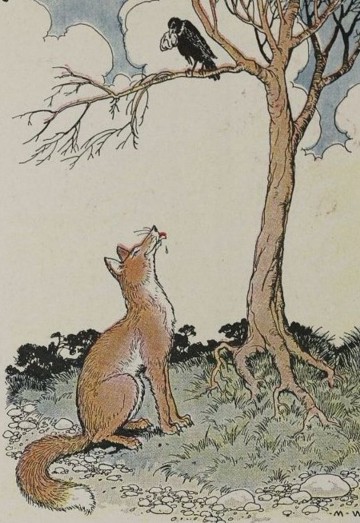| 1. overhead | /OH-ver-HED/ |
| -at a level higher than a person’s head; in the air or the sky above the place where you are | |
| You will see groups of birds flying overhead during their migration. | |
| 2. sly | /slahy/ |
| -deceiving people in a clever way in order to get what you want | |
| Never trust your money to a sly person. | |
| 3. trot | /trot/ |
| -(of a horse or other animal with four legs) to move in a way that is slightly faster than walking | |
| The horses trot gracefully about the farm. | |
| 4. flattering | /FLAT-er-ing/ |
| -making someone look or feel better or more attractive than usual | |
| Flattering remarks are not always honest. | |
| 5. caw | /kaw/ |
| -the loud, rough cry of a bird such as a crow | |
| The crows’ cawing outside yesterday hurt my ears. |

“No need to search any farther,” thought sly Master Fox. “Here is a dainty bite for my breakfast.”
Up he trotted to the foot of the tree in which the Crow was sitting, and looking up admiringly, he cried, “Good morning, beautiful creature!”
The Crow, her head cocked on one side, watched the Fox suspiciously. But she kept her beak tightly closed on the cheese and did not return his greeting.
“What a charming creature she is!” said the Fox. “How her feathers shine! What a beautiful form and what splendid wings! Such a wonderful Bird should have a very lovely voice, since everything else about her is so perfect. Could she sing just one song, I know I should hail her Queen of Birds.”
Listening to these flattering words, the Crow forgot all her suspicion, and also her breakfast. She wanted very much to be called Queen of Birds.
So she opened her beak wide to utter her loudest caw and down fell the cheese straight into the Fox’s open mouth. “Thank you,” said Master Fox sweetly, as he walked off. “Though it is cracked, you have a voice sure enough. But where are your wits?”
The flatterer lives at the expense of those who will listen to him.
| 1. | Where did the Fox see the Crow one bright morning? |
| 2. | How did the Fox describe the Crow in the fable? |
| 3. | What did the Crow want to be called? |
| 1. | Do you think the Fox did the right thing of using flattery to fool the Crow? Why or why not? |
| 2. | In your opinion, was the Fox sincere in complimenting the Crow? Why or why not? |
| 3. | What should the Crow do next time she encounters the Fox? |
| 4. | How do you react to flattery or compliments? |
| 5. | Do you agree with the fable’s lesson? Please explain your answer. |
| Grammar 文法 |
Pronunciation 発音 | Vocabulary 単語 |
Comprehension 理解 |
|
|---|---|---|---|---|
 GOOD GOOD |
文法の誤りはほとんどなく、完全な文章で話すことができる | ほとんどの単語をはっきりと正しく発音することができる | 習った表現を適切に使うことができる | 文章を理解し、質問に正しく答えることができる |
 FAIR |
文法の誤りはあるが、完全な文章で話すことができる | 発音の練習が必要な言葉がいくつかある | たまにミスはあるが、習った表現を適切に使うことができる | 文章を完全に理解するのは難しく、質問に正しく答えられないときもある |
 POOR |
文章で話すのは難しく、単語だけで話すことができる | 発音の練習が必要である | 習った単語と表現を少しだけ使うことができる | 文章を理解するのは難しく、質問に答えるのは難しい |
An eBook from The Project Gutenberg.
This eBook is for the use of anyone anywhere at no cost and with almost no restrictions whatsoever. You may copy it, give it away or re-use it under the terms of the Project Gutenberg License included with this eBook or online at www.gutenberg.org